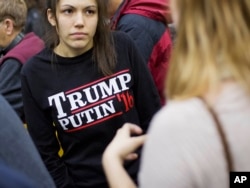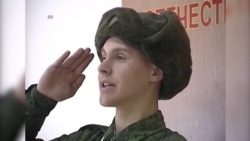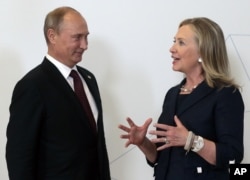Hillary Clinton and Donald Trump have very different views on what kind of relationship the United States should have with Russia, and in particular its leader, Vladimir Putin.
The divide has been clear for months, but was crystalized in a 10-second exchange during the final debate between the Democratic and Republican presidential candidates.
"Putin, from everything I see, has no respect for this person," Trump said, referring to Clinton.
"Well, that's because he would rather have a puppet as president of the United States," Clinton replied.
"No puppet. You're the puppet," came Trump's response.
Cooperate or confront
At campaign events and numerous debates throughout the process leading up to Tuesday's election, Trump has discussed the benefit of working with Russia, especially in fighting Islamic State militants. Clinton has stated the need to stand up to Putin and has accused the Russian leader of supporting Trump, including through allegations that Russians were involved in hacking attacks against Democrats.
Two weeks before the election, Putin rejected claims he was trying to boost Trump as "sheer nonsense." He also questioned why, with issues like U.S. government debt and gun violence, Russia was such a hot topic for the candidates.
WATCH: Presidential Candidates React Differently to Russia's Role in Election
"During the election campaign, this should be the topic of discussion, and other unsolved problems," Putin said. "But apparently the elite has nothing to say to calm the public. So it's easier to distract people's attention to rumored Russian hackers, spies, agents of influence, and so on and so forth."
Putin also said his government would work with whichever candidate the American people elect.
The U.S. and Russia did collaborate on the landmark deal that curbed Iran's nuclear program, but that diplomatic breakthrough seems distant, with the governments now on opposite sides of the conflict in Syria and the U.S. imposing sanctions on Russia for its incursion into Ukraine.
WATCH: Clinton's Debate Comments on Russian Espionage Against Americans
"Russia has decided that it's all in, in Syria. And they've also decided who they want to see become president of the United States, too, and it's not me," Clinton said in mid-October.
She added that cooperation with Russia was "fine," but that she also supported efforts to investigate Russia and Syria for possible war crimes over their actions in Aleppo, Syria.
'Tough dealings'
In January, Clinton said she'd had "tough dealings" with Putin during her time as secretary of state and called him a bully.
The feelings appear to be mutual, according to analyst Thomas Wright of the Brookings Institution, a policy research group in Washington.
"Putin blames Secretary Clinton for the protests against his return to power in 2012," Wright said. "He thinks the United States, and particularly the State Department, was behind those."
Trump has repeatedly criticized Clinton's stance toward Putin and Russia, including in a speech that came the same day Putin wondered why his country kept coming up during the race.
"She speaks very badly of Putin, and I don't think that's smart," Trump said. "How do you speak so badly of someone?"
Trump said he did not know Putin, but if the U.S. and Russia got along, "it wouldn't be so bad."
WATCH: Trump's Debate Comments on US Need to Renegotiate Defense Pacts
Terrorism expert Malcolm Nance says Trump's position differs dramatically from mainstream Republican and Democratic foreign policy leaders.
Trump has referred to NATO as obsolete, has predicted the breakup of the European Union and has suggested that Russia was playing a positive role in Syria. It's "almost a checklist of Vladimir Putin's requirements," Nance said.
No matter which candidate wins, thanks to webs of allies across the world and the U.S. and Russian positions as two of the five permanent members of the U.N. Security Council, the U.S.-Russian relationship will be an important factor during the next administration.
VOA's Cindy Saine at the White House contributed to this report.










